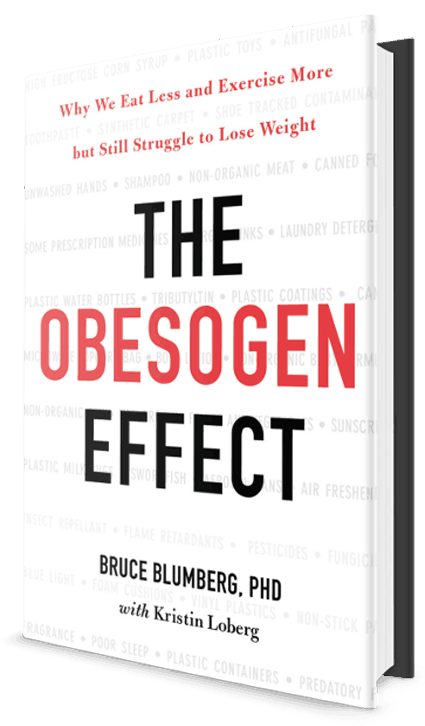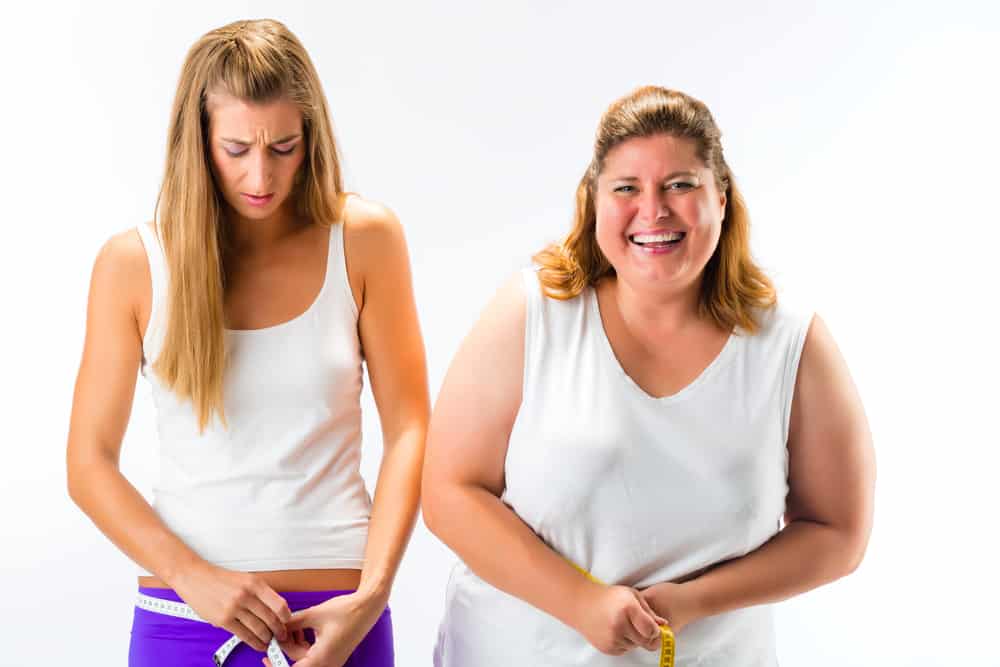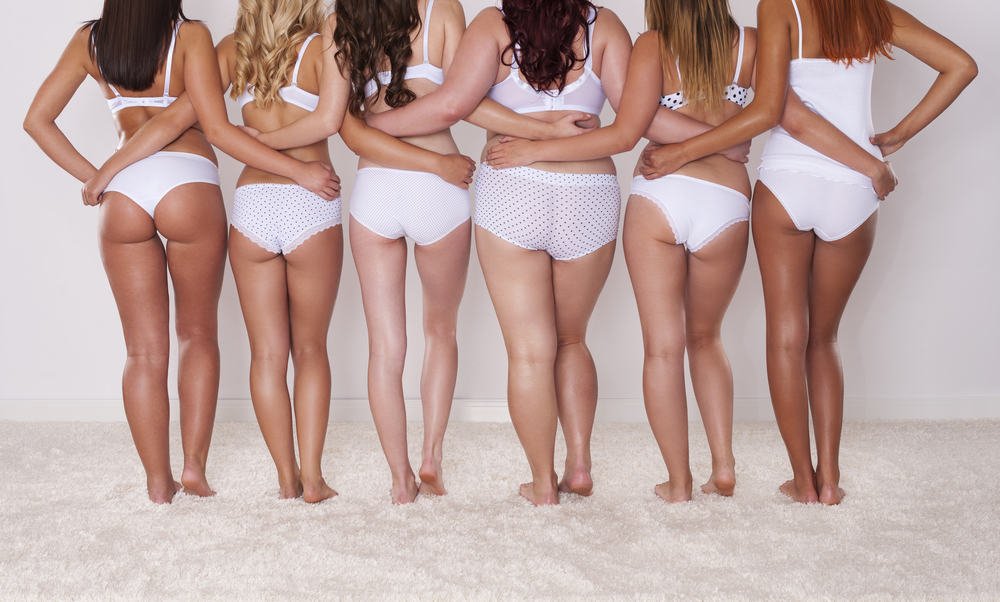Just when you thought it was those french fries making you fat, an organization representing thousands of endocrinologists, aka medical doctors specializing in the body’s hormonal system, announced in a press conference they blame hormone-disrupting chemicals on an increase of obesity rates worldwide. Okay, now you have my attention. *puts down french fries* Hormone-disrupting chemicals are chemicals that interfere with the body’s hormonal systems. These hormonal systems act as traffic control inside our bodies with dominion over metabolism, immune response, development, growth, reproduction, intelligence & behavior. These systems are easily fooled by hormone-disrupting chemicals and start to go awry when they enter the body. Some of these chemicals interfere with the body’s ability to store and process fat, which is why they are also referred to as “obesogens.” Scientists are now suggesting these chemicals could have a huge impact on the obesity epidemic. Could these chemicals also bring on weight gain in millions of people around the world? Endocrinologists from the European Society of Endocrinology think so. You’ve trusted Mamavation to cover how BPA is linked to early puberty in girls, which grocery stores are selling BPA-free cans, and fragrance chemicals linked to degraded sperm quality, now join us as we cover the world of chemical obesogens and their impact on weight.
Table of Contents
 How Scientific Wisdom Around Obesity is Starting To Change
How Scientific Wisdom Around Obesity is Starting To Change
A newly published book about obesogens is throwing orthodox wisdom of how Americans gain weight upside down with leading science. The Obesogen Effect: Why We Eat Less and Exercise More But Still Struggle to Lose Weight published by Dr. Bruce Blumberg of University of California at Irvine goes into detail on the science behind how hormone-disrupting chemicals can cause weight gain. Dr. Bruce Blumberg is the scientist that discovered “obesogens” in his lab over a decade ago and has been traveling the world sharing his discoveries with the rest of the scientific community ever since.
His book starts out,
“When you think about the causes of overweight and obesity, conditions that now affect the majority of Americans, two factors likely come to mind immediately: dreadful dietary habits and lack of exercise. This is what I call the “orthodox wisdom” that we hear all the time. But what if I said you are wrong? Well, at least not 100 percent right. You’re missing a huge influencer that has been driving our epidemic for the last half century, and it has nothing to do with a penchant for sitting on the couch eating potato chips and drinking regular soda. It has to do with obesogens–chemicals in our environment that promote weight gain.”
Chemical obesogens within our environment have increased significantly in the last 50 years. If you think about how your grandparents ate and what they were exposed to, it starts to make more sense. They ate more butter, animal fat, & bread and didn’t seem to struggle with weight quite like we do. And there are some studies that reflect that difference. In fact, studies have looked at the weight of individuals now and compared it to individuals in the 1970s. Adjusting for several factors, they found that people who consumed the same amount of calories and got the same amount of activity are 5-10% heavier today than they were in the 1970s. This study was primarily ignored by the mainstream media, but a strong scientific case is building that is having us rethink “orthodox wisdom” about how weight is gained. Could there be other factors is the main question independent scientists have.
How Do Obesogens Affect The Body?
Obesogens have the ability to reprogram our cells in a few ways that result in a muffin top and complete frustration. Have you ever found it difficult to lose weight? Do you feel like you have just been “big boned” your whole life? Are you hungry and feel like you don’t get enough food? The hormonal impacts behind what obesogens do explain all these challenges modern people have with weight living in first world countries. Obesogens have the ability to work in several ways but the outcome is the same–weight gain.
- They encourage the body to store fat and reprogram stem cells to become fat cells;
- They prompt the liver to become insulin resistant, which makes the pancreas pump out more insulin to control blood sugar, leading to increased fat storage all over the body;
- They prevent leptin, which is the satiety hormone, from working properly in the body;
- They prevent you from losing weight when restricting calorie intake, i.e. dieting;
- They inhibit thermogenesis, which is the burning of fat to produce heat.
One of the most important parts to understand about this process is the most vulnerable segments of the population are pregnant women, small children, and adolescents. Basically, most of the damage is done before adulthood, which may not be evident until adulthood. And therefore it’s very important for families to understand how obesogens work in order to protect future generations.
Plenty of science has been mounting over decades pointing to this scenario but corporations have turned a blind eye because it costs money to reformulate products. But that doesn’t release them from responsibility. Corporations that are turning a blind eye to the science of endocrine disruption are delivering dangerous chemicals to families. Harmful chemicals, like those produced by a corrupt cosmetic industry, aren’t regulated by the federal government. They make up their own rules. Then there are industries with more checks and balances, but TONS of money lobbying Congress to limit the amount of funding they receive to be compliant. And when you look at the big picture, it’s evident it’s creating a health crisis that we are going to have to pay for. It’s estimated that the United States spends $340 billion per year on health care expenses and lack of productivity connected to hormone-disrupting chemicals. Previous studies have identified these chemicals in many everyday products, such as carpet & furniture chemicals, pesticides on food, packaging chemicals leaching into water & food, nonstick chemicals on your cookware, and artificial sweeteners.
Results From Study By The European Society of Endocrinologists
Dr. Ana Catarina Sousa from the Universities of Aveiro and Beira Interior, Portugal, reviewed studies on weight gain and hormone-disrupting chemicals and found that the most important exposure sources of obesogens that lead to weight gain are as follows:
- Diet
- Household Dust
- Cleaning chemicals
- Kitchenware
- Cosmetics
“Obesogens can be found almost everywhere, and our diet is a main source of exposure, as some pesticides and artificial sweeteners are obesogens. Equally, they are present in plastics and home products, so completely reducing exposure is extremely difficult – but to significantly reduce it is not only feasible but also very simple”, Dr. Sousa says. She then explains further studies are needed in order to provide unequivocal evidence of how obesogens contribute to the obesity epidemic. “These are baby steps to achieve an obesogen-free lifestyle but a really good start. Essentially, watch your diet and get rid of the dust at home”, Dr. Sousa comments. “Adults ingest about 50mg of dust every day, and children twice as much, so keeping the house clean is a very effective measure. And use a humid cloth to dust your furniture, rather than a cleaning product that may contain more of these chemicals.”
Dr. Souza and her team intend to launch a new cohort study to monitor obesogen levels in urine and hair of pregnant women, and in their children, to further determine how obesogens affect their obesity risk.
Recommendations From Researchers On How to Avoid Obesogens
Based on the findings of the meta-analysis, several recommendations were also included in order to help the public take action and protect their families. The recommendations include:
- Choosing fresh food over processed products with long lists of ingredients on the label – the longer the list, the more likely the product is to contain obesogens
- Buying fruit and vegetables produced without pesticides, such as certified organic or local pesticide-free products. Talk to you farmer about what he does and support those who are farming without toxic persistent pesticides
- Reducing the use of plastic, especially when heating or storing food. Instead, use glass, stainless steel or aluminum containers for your food and drinks.
- Removing shoes when entering the house to avoid bringing in contaminants in the sole of shoes
- Vacuuming often, using high-efficiency particulate air (HEPA) filters and dust your house frequently using a damp cloth.
- Removing or minimizing carpet at home or work, as they tend to accumulate more dust
- Avoiding cleaning products when possible, or choose those that do not contain obesogens
Green Enough: Eat Cleaner, Be Happier (All Without Driving Your Family Crazy!) is a great book to pick up for more details on how to detox your life from obesogens that lead to weight gain.
What About the Naysayers?
There will be several opponents of this new research primarily because the chemical industry employs thousands and makes billions of dollars every day. This research is a direct hit on their ability to profit and do business in a regulatory system that doesn’t look into hormonal impacts on humans. However, what they can’t explain away is how babies have been affected by these chemicals…yes a significant increase in fat babies. Babies can’t exercise. Their job is to lay there and get fed and for centuries they didn’t have a weight problem until the modern world. They’ve also found similar patterns in the animal kingdom, which points to environmental factors like obesogens once again.
In their press release they go on to state the following: “There is no doubt that excessive calories intake and lack of exercise, are important factors, and that genetics plays a critical role. However, because genes in the population do not change fast enough, other causes must be involved. The involvement of other causes in the etiology of obesity is further strengthened by the fact that obesity is increasing sharply in young children, including babies for whom changes in exercise and eating patterns are unlikely to have occurred in the past decades. Furthermore, increases in body weight have also been reported in laboratory, domestic and wild animals. Such evidence strengthens the hypothesis that environmental factors are at play. In 2006, a new theory on the role of environmental contaminants in the etiology of obesity was proposed by Dr. Bruce Blumberg. This theory, known as the “obesogen effect” postulates that environmental chemicals are able to promote obesity by increasing the number of fat cells and/or the storage of fat into the existing adipocytes. It was originally proposed for tributyltin (TBT), a potent endocrine disrupting chemical responsible for sex changes in marine gastropods. This endocrine disruptor was responsible in vitro and in experimental animals for the induction of adipogenesis; furthermore, prenatal exposure to TBT in mice was associated with adiposity later in life and in future generations. Since the obesogen theory was proposed, compelling evidence from in vitro, in vivo epidemiological studies arose in the scientific literature and today several chemicals are considered as obesogens.”
What Are Your Sisters Doing About This?
I know this sounds awful, but there is tons of good news out there. Mamavation supports and partners with several groups who work to educate the public, lobby Congress, and help the good guys prevail. There are a couple of examples I wanted to share with you right now to show you who you can follow and support as well.
Check out what Beautycounter is doing to make the world safe for humanity. Beautycounter isn’t your ordinary cosmetic company. The women of Beautycounter are green ninjas disguised as eco beauties selling safer cosmetics. This is how a beauty brand raised over 30,000 political activists that actively lobby for safer chemicals online, within their community, and in the halls of Congress. Pairing safer chemicals with people who are passionate about the health of children and the rest of the planet. Seems like a win-win to me. You can find a Beautycounter advisor very easily by just asking on your Facebook wall. Support one local to you!
Women’s Voices for the Earth is actively focusing on the toxicity of feminine care products. And I love some of their newest videos pressuring Summers Eve to reformulate ingredients and educate women on the chemicals they don’t tell you about in feminine care. For instance, did you know that Summers Even has spermicide inside their feminine wash products? What if you were trying to get pregnant? Feminine wash is bullsh*t. Your vagina naturally washes as you live your life. Perhaps if there is an odd smell you may want to get it checked with a doctor because it can be something problematic.
There are tons of additional examples of organizations working to solve this problem for you. So what should you do about it? If you are struggling to lose weight, you may want to first start to look into what type of exposures are inside your home that can impact the health of your hormones. We’ve done all that work for you in Green Enough: Eat Better, Live Cleaner, Be Happier (All Without Driving Your Family Crazy!). Pick up a copy of this book if you would like to laugh as you are detoxing the home. I’m serious, this can actually be fun if you are reading the right book that makes you feel empowered instead of victimized. Then start spreading the word about what is happening with your friends and family so they can start choosing safer products. When companies start losing market share based on a change in desires of consumers, they pay attention. They want those dollar dollar bills ya’ll so they get busy reformulating. And that’s a good thing! And finally, keep up to date on what is happening around you by signing up for the Mamavation newsletter here. We got your back girl! Let us do the heavy lifting and bring you the bits and pieces you need to take action on.
Does This “Ring True” to You?
How do you feel about the science of obesogens? Does this study “ring true” to you and your experiences? Are you proud of what your sisters are doing around the world to combat these problems? Share your thoughts.
For some additional tips and tricks follow Mamavation on Instagram, Facebook & Twitter.



 How Scientific Wisdom Around Obesity is Starting To Change
How Scientific Wisdom Around Obesity is Starting To Change 





 Safer Pest Control: Toxic vs. Non-toxic Insect Repellant Brands Around Children
Safer Pest Control: Toxic vs. Non-toxic Insect Repellant Brands Around Children
Love all the info in this article, I have been looking into cleaner personal items and makeup especially since I have 4 daughters.
I forgot about the 4 daughters. You have your hands full girl!